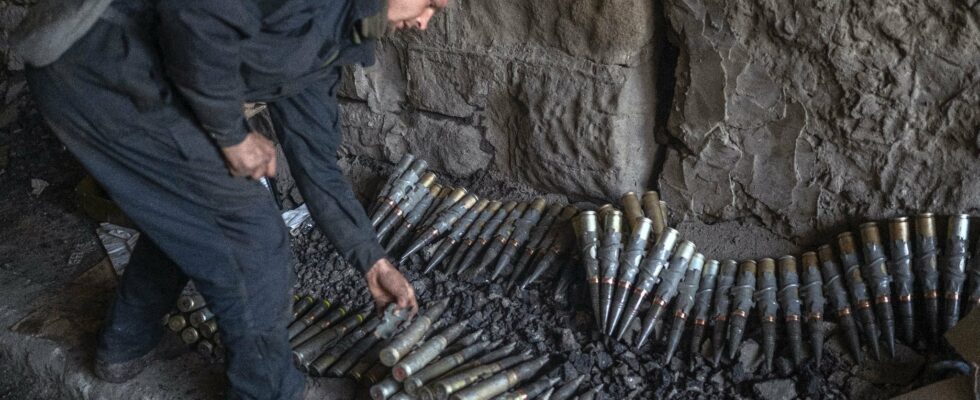The affair risks angering the Kremlin. In an investigation Published on Thursday, September 19, the British news agency Reuters demonstrates that artillery shells sold by Indian arms manufacturers to European countries were diverted to Ukraine to support the war effort against Russia.
An investigative work that is based on the testimonies of 11 officials from the Indian and European governments and the defense industry, supplemented by an analysis of available customs data. If the Indian government, close to Moscow, contested this information on Thursday, several sources cited by Reuters affirm that New Delhi has done nothing to prevent these transfers of munitions.
Shells purchased empty and then filled with explosives
In its investigation, the news agency shows that at least two European countries are concerned by these transfers: “Italy and the Czech Republic”, according to the testimonies of two Spanish and Indian officials. Information corroborated by a former senior executive of Yantra India, “a public company whose munitions are used by Ukraine”.
The investigation highlights in particular the example of the Italian defense company Meccanica per l’Elettronica e Servomeccanismi (MES), Yantra India’s main foreign customer. The Rome-based company is said to be buying empty shells in India before filling them with explosives and sending them to Ukraine. And this is not a new phenomenon. The British press agency reveals that this transfer of munitions “has been taking place for over a year, according to sources and customs data.”
However, the volume of Indian weapons sent to kyiv remains small in the scale of military support to Ukraine. Citing two Indian government sources and two sources in the Indian defense industry, Reuters estimates that these munitions correspond to “less than 1% of the total weapons imported by kyiv since the beginning of the war”. In detail, Reuters was not able to find out whether these munitions were resold or given to Ukraine by these European companies.
Indian denial contradicted by investigation
A question that could be crucial in this case. As the British agency specifies, “Indian arms export regulations limit the use of weapons to the declared buyer, who risks seeing his future sales interrupted in the event of unauthorized transfers.” This legislation had notably been strengthened in May 2024, recalls the BBCby “obliging buyers to ensure that weapons are not sent to third countries.”
In response to the Reuters inquiry, India’s foreign ministry issued a sweeping denial on Thursday: “This implies violations by India where there are none and, therefore, it is inaccurate and malicious,” ministry spokesman Randhir Jaiswal said. on the social network XThe same spokesperson had also affirmed in January that India had never sent or sold artillery shells to Ukraine, notes Reuters.
Despite these statements, the British agency’s investigation tends to demonstrate the opposite: according to a senior Indian official and a “defense industry executive with direct knowledge of the transfers, […] India has taken no steps to limit this supply to Europe.” And this, while Russia is said to have “raised the issue on at least two occasions, including during a meeting in July between Russian Foreign Minister Sergei Lavrov and his Indian counterpart,” Reuters reports, based on statements by three Indian officials.
A new sign of Indian non-alignment
While Russia has not yet reacted to these revelations, they could well cause a chill between the Kremlin and its Indian ally. “As India’s main arms supplier for decades,” Moscow has grown even closer to New Delhi since the start of the war in Ukraine, while Indian Prime Minister Narendra Modi had refused to participate in the Western sanctions regime against Russia, the British agency recalls. However, the Indian government has often “insisted on the importance of respecting the territorial integrity and sovereignty of nations,” the BBC tempers.
Behind this Indian double game, there is also an economic interest, reveals Reuters: “For a long time the largest arms importer in the world, [l’Inde] also sees the long war in Europe as an opportunity to grow its nascent arms export sector, according to six Indian sources.” The survey notes in particular a spectacular increase in Indian arms exports to four European countries (Italy, Spain, the Czech Republic and Slovenia) between February 2022 and July 2024: from 3 to 135 million rounds of ammunition exported. That is an increase of 4,730%.
Asked by Reuters, Walter Ladwiga specialist in South Asian international relations, believes that New Delhi has everything to gain from this: “This allows India to show its Western partners that it is not only on Russia’s side in the Russo-Ukrainian conflict.” A position consistent with India’s usual non-alignment on the geopolitical scene.
